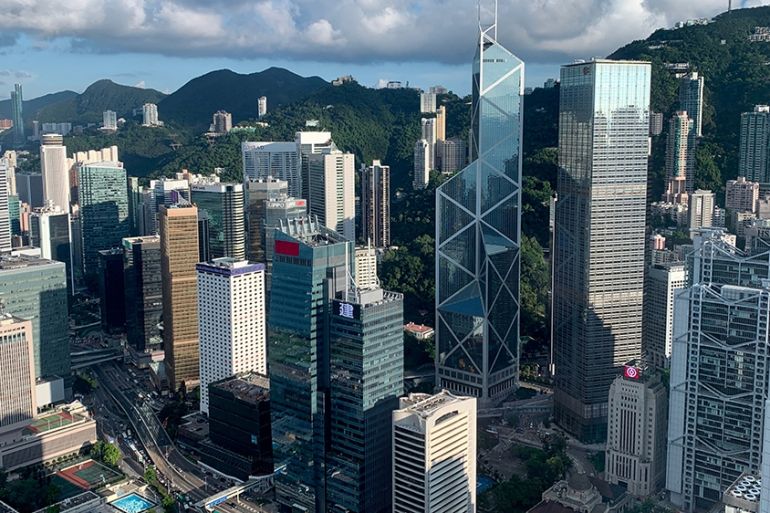China vows retaliation against US over Hong Kong sanctions
Move comes after Trump signed a law and an executive order to punish China for its ‘aggressive actions’ in Hong Kong.

China has said it would retaliate after US President Donald Trump ordered an end to preferential trade treatment for Hong Kong and signed legislation allowing sanctions over Beijing’s enactment of a draconian security law in the semi-autonomous city.
In a statement on Wednesday, China’s foreign ministry said it “firmly opposes and strongly condemns” the Hong Kong Autonomy Act, which unanimously passed the US Congress earlier this month and approves sanctions on Chinese officials and banks over Beijing’s clampdown in Hong Kong.
“China will make necessary responses to protect its legitimate interests, and impose sanctions on relevant US personnel and entities,” the ministry added, without elaborating.
The Chinese warning came amid mounting tensions with the US – not just over Hong Kong – but also over trade, the global coronavirus pandemic, China’s military buildup in the South China Sea and its treatment of Uighur Muslims in the western region of Xinjiang.
Trump on Tuesday stepped up the pressure to punish Beijing for what he called its “aggressive actions” in Hong Kong, a former British colony that was returned to Chinese rule in 1997 with the promise of autonomy and freedoms not known in mainland China.
“Today I signed legislation, and an executive order to hold China accountable for its aggressive actions against the people of Hong Kong,” Trump told reporters at the White House.
|
|
“Hong Kong will now be treated the same as mainland China – no special privileges, no special economic treatment and no export of sensitive technologies,” he said.
“Their freedom has been taken away; their rights have been taken away,” Trump added. “And with it goes Hong Kong, in my opinion, because it will no longer be able to compete with free markets. A lot of people will be leaving Hong Kong.”
Trade surpluses, sanctions, travel bans
China had defied international warnings earlier this month by imposing the national security law, which criminalises offences it broadly defines as subversion, secession, terrorism and collusion with foreign forces. The legislation sent a chill through Hong Kong, which last year saw massive, and sometimes violent, pro-democracy protests.
In response, the US Congress unanimously passed the Hong Kong Autonomy Act, which targets police units that have cracked down on Hong Kong protesters as well as Chinese Communist Party officials responsible for imposing the new security law.
Mandatory sanctions are also required on banks that conduct business with the officials.
Trump’s executive order on Tuesday said the US property of any person determined to be responsible for or complicit in “actions or policies that undermine democratic processes or institutions in Hong Kong” would be blocked.
It also directs officials to “revoke license exceptions for exports to Hong Kong”, and includes revoking special treatment for Hong Kong passport holders.
However, analysts say that completely ending Hong Kong’s special treatment could prove self-defeating for the US.
|
|
Hong Kong was the source of the largest bilateral US goods trade surplus last year, at $26.1bn, US Census Bureau data shows. According to the US Department of State, 85,000 US citizens lived in Hong Kong in 2018, and more than 1,300 US companies operate there, including nearly every major US financial firm.
The territory is also a major destination for US legal and accounting services.
Al Jazeera’s Divya Gopalan, reporting from Hong Kong, said Washington’s move has worried businesses in the city.
“The Hong Kong government says this is likely to hurt the US more than it will hurt Hong Kong, and indeed, if you look at the numbers, the US has a bigger trade surplus with Hong Kong. But the reality is there are many Hong Kong businesses that rely on this special status with the US,” she said.
“Hong Kong is a re-exporting hub, which means that goods and services come through Hong Kong into the US to avoid those trade sanctions or restrictions that China may have in dealing with the US.”
The US began eliminating Hong Kong’s special status under US law in late June, halting defence exports and restricting the territory’s access to high-technology products.
Other actions in the works include suspending an extradition treaty with Hong Kong, something Australia has already done, as well as ending legal cooperation agreements, taxation accords and financial understandings that cover accounting rules for Chinese businesses that work in the US.
At the same time, the Trump administration has pressed ahead with travel bans for Chinese, Hong Kong and Communist Party officials the US believes are responsible for curtailing democracy in Hong Kong.
The administration has also gone after China by imposing travel bans on officials for repressing minorities in Xinjiang and hindering foreigners’ access to Tibet.
On Monday, US Secretary of State Mike Pompeo announced that the US had decided to reject outright virtually all Chinese maritime claims in the South China Sea, a determination that could lead to increased tensions in disputed, critical international shipping lanes.